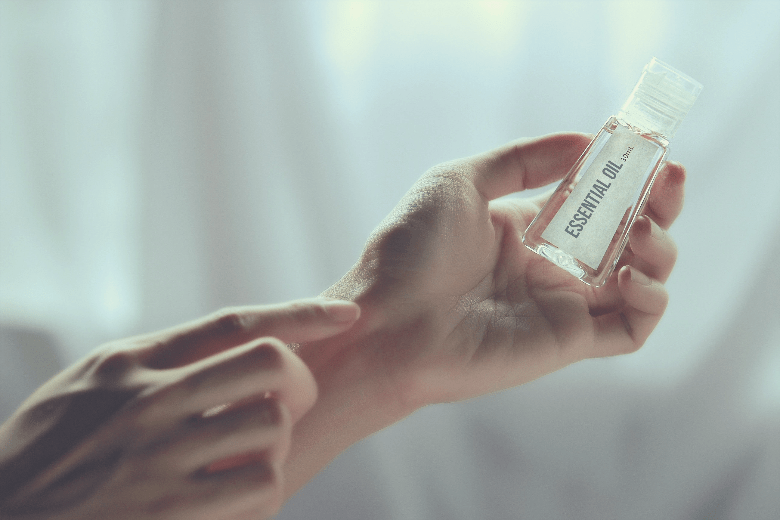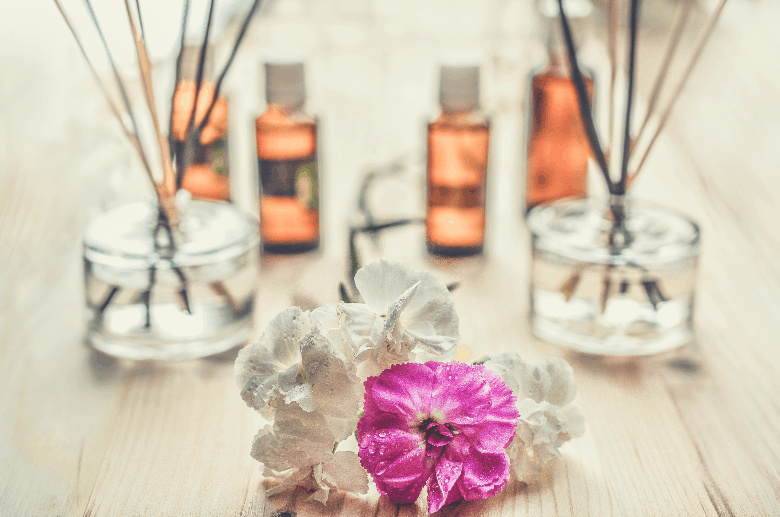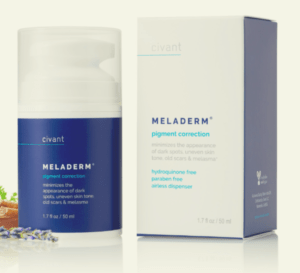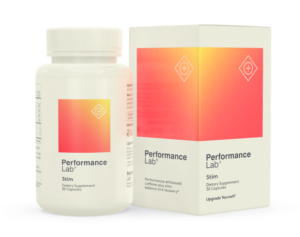Just a few years ago, I didn’t have any idea about aromatherapy. As fate would have it, I got into an accident that required multiple surgeries. In fact, recovering from the after-effects of accidents proved more painful than the surgery.
Luckily, one of my friends introduced me to therapy using essential oils. He suggested using citrus oil to uplift the mood and lavender to get a good night sleep. In just a couple of months, depression gave way to energy and hope. Fast forward three years, I’ve taken professional courses in aromatherapy and my closet is full of essential oils.
This article is written from the perspective of introducing readers to the amazing world of aromatherapy and its benefits. Hopefully, you can also get help from nature’s wonderful gift that most of us continue to ignore.

What is Aromatherapy?
It is a treatment that uses extracts from natural plant to improve health and muscular functions. The extracts are in the form of oil; therefore, the type of therapy is also known as essential oil therapy.
Experts believe that it not only improves body functions, but its exposure also has a positive impact on the development of mind and spirit. In other words, it can be said that we can improve our mental and cognitive abilities.
The practice has been widely used and accepted for thousands of years dating back to Chinese and Indian cultures. The Egyptians are also well-known to use plant extracts to enhance their physical and psychological health.
Recently, researchers have started studying oil treatment from a scientific aspect. Numerous studies have also concluded that treatment has a positive impact on the mind and body. In fact, it is not the first time that researchers are intrigued by the use of essential oils.
A History of Natural Oils
Since the 16th century and throughout European Renaissance, the distillation of essential oil was common in Germany. In the early 19th century, French scientists and the medical community also recognized the potential of natural oils in treating certain diseases.
In 1937, the term “aromatherapy” was coined by a French perfumer who noticed the healing potential of lavender extract in treating major burns. As most doctors focus on treating patients using chemical drugs, a large medical community in Germany and France still use natural oil extracts to treat illness.
How Does Aromatherapy Work?
There are two methods that are mainly used to cure symptoms. These include treatment through smell and skin absorption.
Using the sense of smell, different products such as diffusers, aromatic spritzers, inhalers, and facial steamers are used to improve mental health. This method is most commonly used to increase mental well-being and enhance spiritual powers.
In contrast, body oils, natural lotions, clay masks, and bathing salts are mostly used to improve health. It is also very common to use a combination of any one of these methods. For instance, experts can combine bathing salts with aromatic spritzers.
There are hundreds of natural oils and plant extracts that can be used to enhance body functions and treat disease. Essential oils are not only popular but they are also readily available in the natural environment. Lemongrass, olive oil, lavender, mandarin, and peppermint are only some of the most common examples of sources that can provide oil extracts for healing purposes.
The Benefits of Aromatherapy
There is no denying the fact that the practice can be beneficial to treat a lot of symptoms. If you’re a skeptic, you or someone in your family must have used steam to treat symptoms of flu and cold, which indicates that we believe that natural elements can play an important part in improving our health.
It is also true that the scientific community has found new evidence that vapors and oil extracts have antimicrobial activity, which has antiviral, antifungal, and antioxidant properties.
While the jury is still out regarding the conventional treatment of medical conditions, essential oils are well-known to treat common symptoms such as nausea, cold, anxiety, depression, headaches, muscular pain, menopausal problems, and blood circulation.
Precautionary Measures
Just as you would use a chemical drug, these products are also chemicals that can be hazardous to health, if used inappropriately.
Before using it yourself, you should understand that there is a difference in using these techniques yourself at home and consulting an expert. Often, experts provide useful instructions on the quantity and frequency of application after evaluating the symptoms and body structure.
For instance, it is very common to use clove oil for toothache and mouth sores without consulting an expert. While clove oil is known for treating such conditions, it can be harmful if certain precautions are not followed. If you realize that healing products contain chemicals, you must also pay attention to using these chemicals responsibility.
Similarly, application of peppermint oil for relieving digestive problems can backfire if used without instructions or it may not have any visible effect at all.
Most first-time users do not understand that essential oils and aromatic products are never applied directly to the skin. Instead, they are first diluted with a carrier oil such as almond or olive oil.
If you plan to use natural oils to treat medical symptoms, don’t blindly trust whatever is stated on the Internet. Instead, use the Internet to learn and educate yourself before taking a decision to use aromatherapy or consult an expert who can guide you, accordingly.
If you reside in the United States, you should know that the U.S. Food and Drug Administration does not regulate such products. As a result, it makes sense to buy these products from a reputable store.
When buying online, shop from only highly reputable sources that can ensure that your products are 100% pure and contain ingredients, as listed.
What’s a Pure Essential Oil?
There is a lot of confusion and misunderstanding between essential oil and aromatherapy oil. Many high-street shops are using the misconception to their advantage by luring potential clients to buy expansive aroma oils instead of the pure essential oil.
Essential oil is always a 100% pure form of oil extracted from its source. In simple words, essential oil does not contain any impurities because there are no preservatives, chemicals, and other ingredients used in essential oil products. If you see something labeled as an essential oil, you should assume that it is 100% pure form of oil.
A lot of us are unaware that high-street shops often sell aroma-therapy oil which is only 2% to 3% dilution of the essential oil in an almond, olive, or grapeseed oil. These oils are packed in similar bottles that are used for essential oil. In fact, some of them are sold for the same price as a bottle of essential oil.
Using these will not benefit you because it does not contain enough oil extract. To make sure that you’re buying the real thing, read the label to understand its ingredients. Essential oils are always 100% pure without any additives; therefore, it is easier for you to recognize if it is the essential oil or it is a marketing gimmick.
Essential oil products are not cheap because it takes a lot of time and effort to extract these oils. Once extracted, it has to be packaged and transported carefully to preserve the content. The supply-chain is carefully managed, which makes the end product, expansive. If someone is selling essential oil for less than the price advertised at a reputable store, you need to think twice before buying the product.
As a rule of thumb, always check the label to see if the advertised product says that it is pure essential oil. Any modifications such as essential oil instead of pure essential oil or aromatherapy oil are a fluke. A lot of retailers and small gift shops are themselves unaware of these practices making them sell these oils without realizing the trickery.
Only 100% pure essential oil will give you all the benefits you require from these chemicals. Anything less than 100% is a poor value for your money.
Uses of Essential Oil
Different essential oils have different uses and effects. While it is impractical to list more than a hundred essential oils, the following examples will highlight how essential oils can treat a variety of problems.
Basil
Oil extracted from Basil is used to treat immune functions related to depression and anxiety. During therapy, the oil massage is known to be effective in relieving headaches and migraines. Due to its chemical structure, it should not be used during pregnancy.
Bergamot
The oil is very effective in treating urinary tract and bladder issues. Therapists have also used it successfully to treat digestive problems. In some countries, it is still used to relieve skin problems due to chicken pox.
Black Pepper
It is used to treat muscular problems associated with joints, pains, and bruises. Its chemical properties are suggested to improve blood circulation, which is used to treat arthritis when combined with Ginger.
Clove
Traditionally, clove is used to treat toothache. It is considered a natural pain killer and antiseptic. When used under the guidance of a therapist, it also controls frequent episodes of nausea and vomiting.
Eucalyptus
Along with peppermint, eucalyptus is used to relieve airways during flu or the common cold. Proper guidance is required when using it because many people are also allergic to its oil extract.
Geranium and Citronella
These naturally occurring plants are widely used as insect repellent. When applied to the body, they can not only cure skin problems but also keep insects, mosquitoes, and fly away from the body.
Lavender
Numerous tests have shown that lavender is very useful in treating minor cuts and burns. It is well-documented to treat burns for thousands of years.
Sandalwood and Jasmine
Known for their aphrodisiac qualities, these essential oils are said to increase alertness. Jasmine is also suggested to increase penile blood flow.
Tea Tree
The product is used excessively in skin care products to restore skin and relieve acne. It has antiseptic and disinfectant qualities that may adversely affect the immune system if swallowed.

How to use Aromatherapy Safely?
The widespread use of essential oils products has encouraged consumers to ask if the deep extracted plant oils are safe to use.
First, it is important to remember that safety depends on many factors, which includes your age and health condition. Secondly, safety depends on how you want to use the product. Everything from the method of use, duration of use, dosage, and chemical composition are necessary to answer the question.
Irrespective of the above-mentioned safety parameters, you should follow guidelines that adhere to general safety regulations when using essential oils.
- Always dilute the essential oil by mixing it with a carrier oil. To prevent an adverse reaction, always keep the concentration level below 5 percent. Carrier oils are usually made from vegetable extracts, and they help apply essential oils to a large surface area.
- Before starting therapy, conduct a patch test by washing your forearm with unscented soap. After drying, rub a few drops of essential oil to the skin. After 24 hours, if your skin feels itchy, red or swollen, you should not use the oil. If there is an allergic reaction prior to 24 hours, wash the affected area with soap and warm water.
- Some of the popular oils can be used without dilution, if necessary. These include rose, sandalwood, tea tree, chamomile, and eucalyptus, among others. Similarly, certain oils such as lemongrass, clove bud, cumin, and cinnamon bark should never be used without diluting it in a carrier oil.
- It is not safe to use essential oil for internal skin such as vagina, mouth, or mucous membranes. Unless supervised by a trained practitioner, you should always avoid internal usage.
- For aromatherapy, it is essential to diffuse products in a well-ventilated area. Always diffuse intermittently in 30 to 60 minutes intervals. Products such as cedarwood, grapefruit, lavender, lemon, spearmint, and tangerine can be diffused without any risk. In contrast, use caution when diffusing clove bud, cinnamon bark, and peppermint, etc.
- During pregnancy, you should never use some of the popular essential oils such as camphor, tarragon, and parsley seed. If pregnant, seek the advice of a professional therapist or medical expert before using it.
- Using essential oil on very young children is a controversial topic. You should avoid using it on children younger than 2 years. If the child is more than 2 years, use safety guidelines as per age requirements. Usually, 0.5 to 2.5 percent is used for dilution in young children. Still, it is always safer to ask a child practitioner.
What to do Next?
If this is the first time you’re dealing with essential oil therapy, try to get advice from a local expert in your area. If there are no reputable experts, look for a reputable dealer who sells these products. The safest method is buying essential oil that is independently tested. The information should be clearly printed on the label.
Lavender, Rosemary, and Lemon are the three most common essential oils that you can try anytime. Buy a small amount of these three oils to get a taste of therapy, but follow basic safety guidelines before applying them to the skin or using a diffuser.
Lavender can be applied to get a good night sleep; whereas, rosemary is great for improving concentration and focus. Similarly, lemon can be used to freshen up a room.
Sometimes it’s better to get a passive diffuser that allows you to spray essential oil into the air. These passive diffusers only scent a very small area; therefore you can also use it in your office or a study.
Using a passive diffuser can get you accustomed to different scents while observing any negative allergic effects. As these diffusers cover only a small area, you can be sure that others in the surrounding will not be bothered by your experiments.
Once you have a small collection of essential oil, it is important to store them in a cool and dry place. Most experts recommend buying a small wooden box to store, but you can also use a covered cardboard box as a good alternative.
Essential oils and aromatherapy products can instantaneously lift up your mood. If you enjoy the therapy, expand your collection to include other oils that are used for different functions. Just remember to use them safely and follow instructions carefully.
You need to remember that essential oils are not alternate to modern medicine. I am not suggesting that you should stop seeing your doctor and adopt an alternate lifestyle. Instead, the idea behind writing this article is to convince you to live a healthy lifestyle that will reduce your dependency on pharmaceuticals and medicine.
Taking a natural path to body care yields positive result that can help us enjoy life to the fullest. If you’re still not convinced, just spend a couple of dollars to give it a try. Maybe, you will be among those gifted people who have relished the experience of a lifetime.



